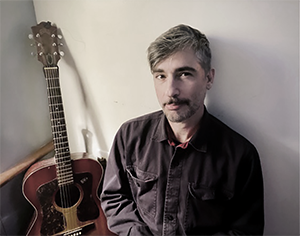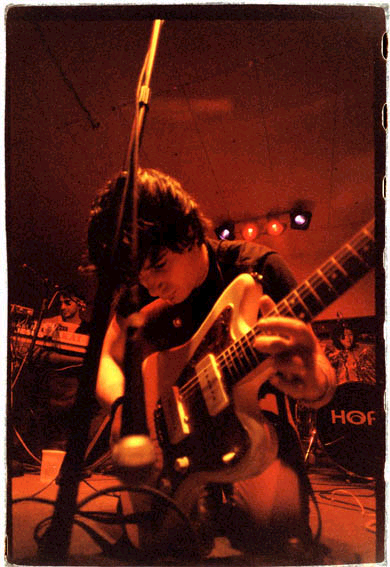Tired of Talking About Guitar Pedals: 5 Questions for Jason Sebastian Russo
By Craig Morgan Teicher
Jason Sebastian Russo is currently studying fiction and poetry in the Writing Seminars as a dual-genre MFA candidate. He’s also the residential teaching fellow for the Spring term. But before he came to Bennington, he had a long and flourishing career in indie rock—he was a member of the legendary Mercury Rev as well as a number of other bands, including Hopewell, Guiding Light, and Pete International Airport. As he begins his semester on campus, he and I talked about how he found his way from the stage to the page, the differences between songs and poems, and the power and importance of teaching.
 Can you give a thumbnail sketch of your journey so far?
Can you give a thumbnail sketch of your journey so far?
I grew up in Dutchess County, in New York, and spent my twenties in the Catskills and then my thirties and forties in Brooklyn, and now I've come back upstate, but I can't afford to live where I'm from. I've finally been gentrified. Crazy feeling. But that's where I live and the context within which I live. I started touring not too long after high school. I lucked into a band called Mercury Rev that took me around the world. I became their bass player and toured on and off for the next 10 years.
But there was something you were looking for that you weren’t finding in the music world?
Eventually I got tired of talking about guitar pedals and I realized that whenever anybody with a book in their pocket walked by the venue, I’d follow them (like a puppy?). I had had the rock and roll conversation so many times I’d milked everything of value out of it. I needed to find more people like me, in this one specific area that wasn't being nurtured at all.
So how did you start getting into creative writing?
It began with the invention of Twitter around ’09. I started anonymously writing on this “free” website all day, every day, tweeting out whatever I thought. Fast-forward to four years ago. I've been solicited by literary journals; the alt-lit scene has embraced me; and I'm the sort of spiritual godfather to these lost, beautiful poets and comedians on that website. I cherish them and I hope they cherish me.
The connection to Bennington was through a friend with whom I had done a recording session years ago. Ten years after that, we re-met on Twitter, and she introduced me to Bennington. I think that education and institutions like SUNY—I got my undergraduate degree through SUNY Empire Statue University, where I currently design classes—and Bennington are these bright lights in a dark globe. The lights are twinkling, and some are winking out.

What are you looking forward to in terms of the teaching fellowship?
So much, man. I consider art a form of service. It's the only way to make anything with any dignity. I'm really looking forward to meeting new artists on their way to becoming what they're going to be. I feel like I have a lot to offer in that scenario. And I'm fascinated by Professor Sandra Simonds's work. I think we have a lot of similarities. Super excited about watching her and her way of educating, and it's Fundamentals of Creative Writing, so I'll be secretly learning at the same time.
How are writing music and writing fiction or poetry similar or different for you?
The power of music can make the dumbest stuff sound great. You can get away with way more in a song. You can get away with anything, I think. With poetry, you are naked. Everything you do will be analyzed on a language, context, everything level, without anything defending it. And it is no longer you anymore, too; it's out of you. It's just sitting there. It's a poem. So it's riskier, and it takes more courage.